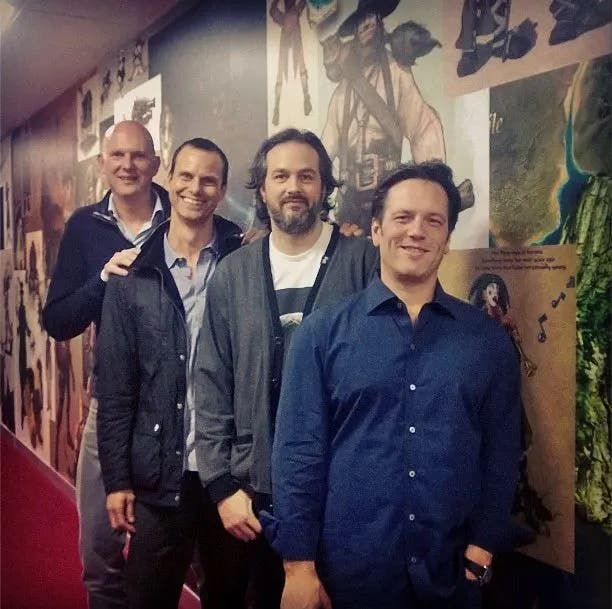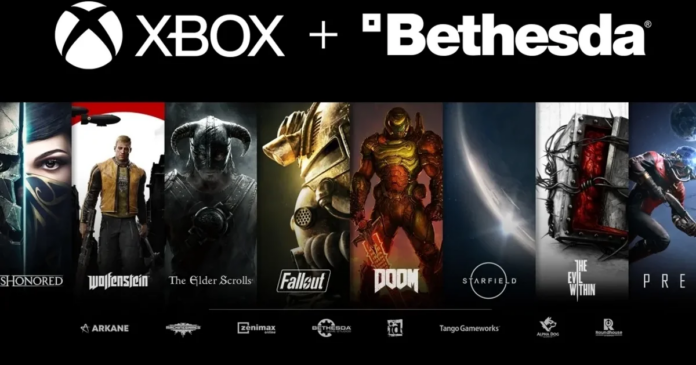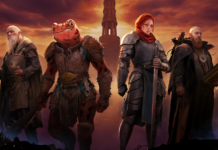The 360 years feel like a lifetime ago. This week, Xbox stunned the industry by announcing it had closed three studios, and repurposed a fourth into another service game support team. This follows the 1900 people laid off across Xbox at the start of this year, and those Xbox employees quietly caught up in the 10,000 layoffs Microsoft made the year before. It has been a disastrous piece of PR self-sabotage, particularly with the reputations of these studios in mind.
Arkane Austin struggled with the uncharacteristic co-op, online shooter elements of Redfall, but before that made the excellent 2017 reboot of Prey and the first, fantastic Dishonored that led to the immersive sim’s modern mini-revival. Tango Gameworks, Microsoft’s only Japan-based studio that was led, until earlier this year, by horror legend Shinji Mikami, made The Evil Within games and the critically acclaimed, BAFTA-winning breakout Hi-Fi Rush. Roundhouse Studios was founded by the makers of the original Prey, but is now presumably destined to make different coloured leather boots for The Elder Scrolls Online. Alpha Dog made mobile games, an area where Microsoft has been specifically looking to expand. More broadly, for two console generations now, Xbox has floundered under a clear and obvious lack of inventive, attention-grabbing exclusive games. It just bought these studios in 2021.
If it weren’t for the people involved, in 2024, these closures would almost feel routine. This is far from the end of Xbox, of course – in Los Angeles next month, it’ll hold yet another make-or-break press conference, that maps out yet another plan for rescuing a lost generation. But be it through exasperation or exhaustion – or the wider industry’s sheer, pent-up rage – this feels like something of a nadir. Xbox has spun its wheels for more than a decade, lurching from U-turn to U-turn, strategic reboot to strategic reboot, acquisition to acquisition, closure to closure. The good times have always felt just over the horizon. Project Scorpio will set the tone; Game Pass is the future; the Series X will have the games; Starfield will jump-start Game Pass now it’s stalled. The growing sentiment today is that they’ll probably never come.
The immediate response is, justifiably, anger. Closing studios always feels villainous, but closing award-winning ones, ones with eminent talent, creativity and expertise, feels genuinely absurd – just as it did with Take-Two and the wonderful people of Roll7 and Kerbal Space Program developer Squad, only last week. But with Microsoft and Xbox, the problem feels part of something bigger. Trace a line through the modern history of Xbox – from the end of the 360 era, through the lost years of the Xbox One, to the present day – and a scarlet thread becomes clear. This is a platform holder that has lost its purpose and direction, that fundamentally – and perhaps inevitably, given the sheer vastness of its parent company – misunderstands why it exists.
Think of any entertainment company. Why was that company founded? Well, in very vague terms: to provide that entertainment. People set up game development studios so they can make games. They set up production companies so they can make films. They found football clubs so their community can play and watch football, record labels so they can hear music, restaurants so they can cook great food and offer people the experience of going out to eat it.
Platform-holders, i.e. console manufacturers and video game producers, descendants of toymakers, card printers and arcade cabinet builders, originated for just the same reason: to provide people with games, with the joy and stimulation they provide and the hardware on which to play them. Satoru Iwata put it much better. “Nintendo’s mission is to try to make people happy, to try to make people smile,” he said, after the unveiling of the Wii back in 2006.
What is the point of Xbox? Go back through the last 10 years or so, to the end of the 360’s golden age and the origins of the Xbox One, and it starts to become clear. The point of Xbox is to achieve, apparently, growth on a massive scale. It is to make more money than it did the year before.
This will seem like ancient history now, but bear with me – the mistakes Xbox made in 2013 are, as we’ll see, worryingly relevant to the struggles it faces right now. We need to start with the infamous “TV, TV, TV” presentation on stage at E3 2013, where Don Mattrick, Xbox’s boss at the time, unveiled plans for the Xbox One. It would be an all-in-one home entertainment device, which was actually quite a nice, interesting, forward-thinking idea (aside from the compulsory bundling-in of the expensive and wildly unpopular Kinect), but the perceived emphasis on non-gaming applications, next to PlayStation’s laser targeting of traditional, blockbuster video games and more graphically powerful console, gave the impression Xbox hadn’t prioritised its core audience.
It’s also the first sign of Microsoft’s backwards thinking with the Xbox, where it sought to grow beyond its core audience not by adding to them, by fulfilling its core purpose of creating new games that more people want to play and new ways to play them, but by offering something entirely unrelated and merging the two together.
But the issue with its priorities ran deeper than the hardware. Take the closure of legendary Fable developer Lionhead, in 2016, and the cancellation of Fable Legends that was due to launch that year. As covered in Eurogamer’s extensive inside story, it was Microsoft’s idea in around 2012, six years after it had bought the once-independent studio, to shift from the single-player RPGs it was known for to a free-to-play, live service multiplayer game in Fable Legends.
Fable was profitable – “highly profitable”, Lionhead’s Simon Carter told Eurogamer – but in a now too-familiar story, it and its genre was seen by Microsoft as just not profitable enough. “That category is not the biggest category on the planet,” said Robbie Bach, who was the President of Entertainment & Devices Division at Microsoft before Don Mattrick assumed the role. “It’s not soccer. It’s not American Football. It’s not a first-person shooter sized category. So at a commercial level, I would say it was successful, but not wildly so.”
Wildly successful was what Microsoft was after. A pitch for Fable 4 was rejected. “It was like, you’ve reached your cap of players for RPG on Xbox and you need to find a way to double that, and you’re not going to do it with RPG,” Fable’s art director John McCormack told Eurogamer at the time. “I thought, yes we can. I said, look, just give us four years, proper finance, give us the chance Mass Effect has, Skyrim has, the games at the time. They’re getting four years and a lot of budget. Give us that, and we’ll give you something that’ll get you your players. Nah, you’ve had three shots and you’ve only tripled the money. It’s not good enough. Fuck off. That’s what I was annoyed about.” (Worth noting: Skyrim went on to sell 63m copies, as of June 2023, The Witcher 3 over 50m.)
Forced into making a game in a genre it knew nothing about, Lionhead bled staff, including McCormack, Peter Molyneux, and the entirety of its senior leadership team. It struggled with development, specifically the unfamiliar concepts like monetisation or multiplayer balance. At the same time, it was being used by Microsoft as poster child for its various initiatives of the day, from being a Windows 10 game (“We didn’t know about Windows 10 when we started developing Fable Legends,” one source told Eurogamer in 2016) to showing the new graphical potential of DirectX 12. All while the free-to-play model of the time relied on development itself being relatively cheap.
A year after the debacle with Lionhead, hotly-anticipated exclusive Scalebound was cancelled in similar circumstances. A third-person action RPG, which Bayonetta developer Platinum’s all about – only one that was for some reason lumbered with a requirement for online co-op – the team again struggled with unfamiliar multiplayer elements. As director Hideki Kamiya put it, the studio “lacked the necessary know-how to build a game based on online features,” which ultimately contributed to its cancellation – again, the same year as its scheduled launch.
The lust for scale continued. That same year came Game Pass, before its full launch in 2018. It came bundled with an aggressive user acquisition plan – at one point you could get three months of it for £1 – and a stated goal to “reach the more than three billion gamers worldwide,” as Ben Decker, head of gaming services marketing at Xbox, told Eurogamer in 2021. Microsoft, ultimately a software business, and one built more and more on cloud computing, partnered with SK Telecom in Korea to soft-launch its game streaming plans in xCloud. “Every screen is an Xbox,” Xbox president Sarah Bond reportedly told staff just a couple of months ago, demoing the surprise Game Pass hit Palworld on tablets, TVs and mobiles.
And yet again, that quest for massive, roof-shattering growth seems doomed. Since 2017, Game Pass has added a steady number of around five million subscribers a year, now sitting at around 34 million as of earlier in 2024. It’s very respectable progress, especially since prices have risen and £1 offers have faded away – it’s also a long way off those 3 billion gamers worldwide.
In interviews, Phil Spencer has put this down to the hard limit that exists with console owners – “at some point,” he told the Wall Street Journal “you’ve reached everybody on console that wants to subscribe.” What might help with that is if Xbox sold more consoles to begin with. Matching the ratio of failure to the previous generation, the Xbox Series X and S have again sold about half the numbers of the PS5. What might both sell more consoles and add to subscriptions is, you guessed it, producing video games that give people joy.
Xbox has failed at this for so long now that it’s become a bore to even mention it – Xbox has no games, you say? What else is new? How are things back there in 2017?! – but these problems are all connected. It can’t ship a big, successful video game because it does not prioritise making one.
Come back to the purpose of a platform-holder: making games and the means to play them, providing happiness, sparking joy, however else you might want to put it. Okay – how is that done? As a platform-holder specifically it’s different to other publishers. It’s about offering developers, the people actually taking the creative risks, the stability they can’t find elsewhere. It’s hiring, retaining, and providing the freedom to talented developers and then giving them the room to try things and, from time to time, allowing those things to fail.
By contrast, the culture that’s developed at Xbox is seemingly one-and-done. One strike and you’re out. Redfall didn’t work? Forget the talent involved in Dishonored and Prey, forget, crucially, the invaluable lessons that team will have learned from its struggles with Redfall. You’re gone. Hi-Fi Rush, exactly the kind of game the platform needs, didn’t drive enough subscribers? See ya. (Despite its nature as “a break out hit for us and our players in all key measurements and expectations”, as Aaron Greenberg, VP of Xbox marketing put it at the time.) When Lionhead was closed in 2016, some developers had been there since the studio was founded in 1997.
What message does it send to a developer if you know you’re one bad game, one troubled project, away from your studio being instantly closed – what does that do to your desire to innovate and experiment? It obliterates it. It drags every developer on that platform towards conservatism, risk-aversion and safe bets. Towards derivativeness – X game with Y elements is big right now – and ultimately creative death.
We’ve already seen this death in action: it’s Lionhead on a free-to-play multiplayer game; Platinum on online co-op. It’s 343 Industries, custodians of Xbox’s flagship series Halo, being slashed in Microsoft cuts while Halo Infinite sits quietly abandoned, a limping, free-to-play battle pass engine. Obsidian on a big, obvious, Skyrim-like fantasy RPG, just the 13 years after that genre took off. (And don’t forget Playground, another UK institution with a specific niche – racing games – on the single-player RPG series Lionhead wanted to make in 2016). The big games this year are Palworld, sure, but also Helldivers 2 and Manor Lords and Balatro. They are surprises, often left-field ones, and sometimes also expensive. Meanwhile Xbox is chasing the highs of a genre that carried a previous generation.
Helldivers 2, for what it’s worth, took eight years to get made. Does any studio last that long without shipping at Xbox today? Does any Xbox game get that chance? Fable Legends certainly didn’t. Rewind to Lionhead in 2016, and the only brief justification given at the time. “These changes are taking effect as Microsoft Studios continues to focus its investment and development on the games and franchises that fans find most exciting and want to play,” Hanno Lemke, general manager of Microsoft Studios Europe at the time, said in a brief statement.
“We acquired Lionhead in 2006, Shut it down in 2016,” says Sarah Bond, in a since widely-shared clip from episode six of Xbox-produced documentary Power On: The Story of Xbox, released in 2022. “A couple of years later, we reflected back on that experience. What did we learn, how do we not repeat our same mistakes?”
“You acquire a studio for what they’re great at now,” continues Phil Spencer, “and your job is to help them accelerate how they do what they do. Not them accelerate what you do.”

Back to today, and compare Matt Booty’s statement, writing to the developers laid off by these latest closures, with Lemke’s in 2016. He describes the decision as being “grounded in prioritising high-impact titles and further investing in Bethesda’s portfolio of blockbuster games and beloved worlds. To double down on these franchises and invest to build new ones requires us to look across the business to identify the opportunities that are best positioned for success.” Eight years apart, the two statements feel remarkably similar.
As ever, with the excessively secretive world of video game development, we don’t quite have the full picture. Overnight, a Bloomberg report claimed these closures and consolidations were part of a “widespread cost-cutting initiative that still isn’t finished.” Booty reportedly told Xbox employees that the company’s studios had been “spread too thin – like ‘peanut butter on bread'”. Jill Braff, head of Zenimax Studios, reportedly added, “It’s hard to support nine studios all across the world with a lean central team with an ever-growing plate of things to do… I think we’re about to topple over.”
The absurdity of that one, after Microsoft spent $7.5bn to buy all these studios, speaks for itself. It may also be the absolute truth, that these studios closed simply because Microsoft and Zenimax felt they had to cut something, and so these wild, untamable beasts must go.
Perhaps most absurd of all, however, was the reported “main factor” Booty and Braff told staff why Tango and Arkane Austin closed in particular. Both were pitching new projects, and needed to staff up and take the time to make them. Tango Gameworks was in the process of pitching a Hi-Fi Rush sequel, Arkane Austin wanted to go back to its immersive sim roots, perhaps with a new Dishonored. Xbox closed these studios, apparently, for having the audacity to try to make video games.

Let’s go back to Lionhead, one last time. There was never a full reason given for that studio’s closure. Its employees had different theories: cost-cutting is the recurring one. “We knew Microsoft hadn’t had a great year with games,” one source said, in what could’ve been any year from the past 10, and it had become clear Fable Legends, much like Redfall’s attempted updates, probably wouldn’t get close enough to recouping costs. But there’s another nugget of information from that period worth drawing attention to: Lionhead, just Arkane Austin, like Tango Gameworks, was fully expecting to move straight onto making the next big thing in the series it made a name from, in Fable 4.
The point here, ultimately, is that this cycle has been repeating, and repeating, and repeating, and it does not show any sign of coming to an end. Xbox buys talent, mismanages it in search of impossible scale, and cuts it loose – be that the 20-year experts of Fable, or the battle-scarred makers of Dishonored, or the invigorating new generation behind Hi-Fi Rush. Xbox’s leadership clearly knows it’s a problem. I believe Phil Spencer and Sarah Bond were utterly sincere when they said they looked at Lionhead and promised themselves not to make the same mistakes again. But to do that, they have to step behind this first, surface-level layer of justification for closing studios, and get to the real cause – not the decisions themselves, but the principles that inform them. The principles that say expertise, creativity and talent are less valuable than the cost to let them flourish.
Dig out the scarlet thread again, and the thing that binds all these moments together couldn’t be more clear. The philosophy of a great video game platform holder is that it makes money in order to make more consoles and more games. The philosophy of Microsoft – and by dint of that, Xbox – is evidently that it only makes consoles and games in order to make money. Like so many businesses owned by gigantic, publicly-traded mega-companies, Xbox is now stuck in a cycle of thinking back-to-front. It, and I suspect much of the video game world, no longer knows why it exists.
www.eurogamer.net







